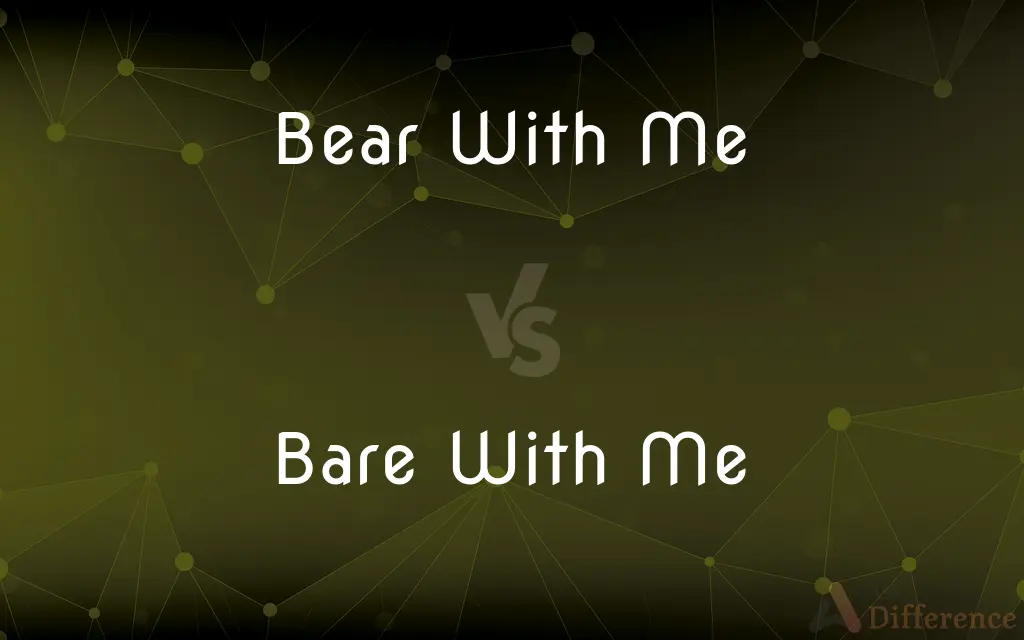Bear With Me vs. Bare With Me — What's the Difference?
By Tayyaba Rehman — Published on November 16, 2023
"Bear with me" means "be patient with me," while "bare with me" is a common misspelling and doesn't have a standard meaning in English.

Difference Between Bear With Me and Bare With Me
Table of Contents
ADVERTISEMENT
Key Differences
"Bear With Me" is a request for patience or tolerance from others while the speaker is trying to accomplish something. It's a phrase used to ask for forbearance in a situation where there might be a wait or some inconvenience. "Bare With Me," on the other hand, is a misspelling, though it seems to play on the word "bare," which means "to uncover or expose," it's not a recognized phrase in standard English.
In English, "Bear With Me" is often used in conversational and formal contexts when someone needs a moment to gather their thoughts, find something, or handle a situation. "Bare With Me" doesn't find its place in formal or informal American English as it's not a recognized construct; it's a malapropism, an error in word usage.
"Bear With Me" derives from the verb "to bear," meaning "to carry" or "to tolerate." It suggests the act of carrying a burden, which in this context, is metaphorical, referring to waiting or being patient. Conversely, "Bare With Me," if analyzed for meaning, would imply exposing oneself with the speaker, which isn't what the speaker typically intends when making this error.
"Bear With Me" is useful in situations where you anticipate someone might become impatient or uncomfortable. It's a polite way to acknowledge the potential inconvenience you're causing. "Bare With Me," although an incorrect expression, might be humorously interpreted as an invitation to undress, based on the meaning of "bare," but it's essential to understand that this isn't a correct or accepted use in English.
Lastly, while "Bear With Me" is a standard, widely accepted phrase, "Bare With Me" is an error you should be cautious to avoid in writing and speech, as it doesn't convey a clear or accepted meaning and may lead to confusion or unintentional humor.
ADVERTISEMENT
Comparison Chart
Meaning
Request for patience
Common misspelling
Usage
Conversational, formal
Incorrect usage
Derived from
"To bear" (to tolerate)
"To bare" (to uncover)
Contextual relevance
Acknowledging inconvenience
None (error)
Correctness in English
Standard English
Not accepted
Compare with Definitions
Bear With Me
Request for patience
Please bear with me while I search for the document.
Bare With Me
Common error in writing
Please bare with me. (Incorrect usage)
Bear With Me
Ask for tolerance during difficulty
Bear with me; this has been a tough time for me.
Bare With Me
Mistaken attempt at requesting patience
If you could bare with me for a moment. (Incorrect usage)
Bear With Me
Ask for endurance during delays
Please bear with me; the service may take longer than expected.
Bare With Me
Error leading to potential confusion
Bare with me, this might take a while. (Incorrect usage)
Bear With Me
Request forbearance while resolving issues
I know it's complicated, but bear with me.
Bare With Me
Unintentional inappropriate suggestion
Can you bare with me? (Incorrect usage)
Bear With Me
Seek understanding while explaining
Bear with me as I try to explain the complex theory.
Bare With Me
Incorrect spelling
Just bare with me. (Incorrect usage)
Common Curiosities
Can "Bear With Me" imply emotional support?
Yes, it can also request endurance or understanding through emotional situations.
Does "Bare With Me" have a place in standard English?
No, "Bare With Me" is a misspelling and not a recognized phrase in standard English.
Why is "Bear With Me" so commonly used?
It's a concise, polite way to acknowledge someone's potential inconvenience while you complete a task.
Is "Bare With Me" a common mistake?
Yes, it's a frequent error because "bear" and "bare" are homophones - they sound alike but have different meanings.
Could "Bare With Me" be considered a joke because of its implications?
If recognized as an error, it might be seen as humorous, but it's essential to consider the context and feelings of those involved.
How can I remember to use "Bear With Me" correctly?
Remember that you're asking someone to "bear" or "carry" patience, which aligns with the correct "bear" spelling.
Is "Bear With Me" appropriate in professional settings?
Absolutely, it's a polite way to request patience while handling a situation or retrieving information.
Are there any historical contexts for "Bear With Me"?
It's been used for centuries, originating from the verb "to bear," meaning to carry a burden, in this case, metaphorically.
Is "Bear With Me" only used in formal contexts?
No, "Bear With Me" can be used in both formal and informal situations to ask for patience.
Can "Bare With Me" ever be used correctly in a sentence?
Not in the sense most people mean when they say it. It's a malapropism and not a valid phrase in English.
What does "Bare With Me" mistakenly imply?
Due to "bare" meaning "naked" or "uncovered," it might unintentionally suggest undressing, leading to awkwardness or humor.
Does "Bear With Me" have other linguistic equivalents?
Yes, similar phrases in other languages carry the same meaning of requesting patience or tolerance.
Should I correct someone who says "Bare With Me"?
Gently and politely, if the context is appropriate for correction, as it's a common mistake.
How can I avoid the mistake of "Bare With Me"?
Remember the correct phrase asks someone to "bear," as in endure or carry, not "bare," as in uncover.
What's the simplest way to differentiate the two phrases?
"Bear With Me" = patience. "Bare With Me" = common error. Remember the context in which you're asking for patience or tolerance.
Share Your Discovery

Previous Comparison
Alloy vs. Intermetallic Compound
Next Comparison
Nebula vs. NebulaeAuthor Spotlight
Written by
Tayyaba RehmanTayyaba Rehman is a distinguished writer, currently serving as a primary contributor to askdifference.com. As a researcher in semantics and etymology, Tayyaba's passion for the complexity of languages and their distinctions has found a perfect home on the platform. Tayyaba delves into the intricacies of language, distinguishing between commonly confused words and phrases, thereby providing clarity for readers worldwide.
















































